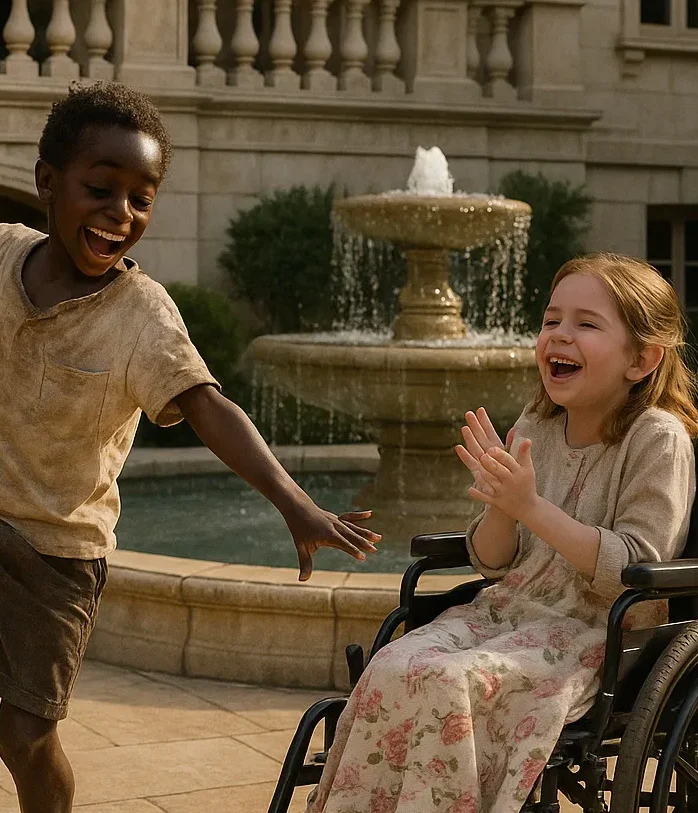
Daniel Carter owned everything money could offer.
His wealth had built towering skyscrapers, launched empires, and made his name legendary in the world of business. But inside the vast walls of his mansion, a heavy silence lingered.
It wasn’t the quiet of peace—it was the stillness of sorrow.
Once, his daughter Emily had brought life to every room. Her laughter had been a melody that brightened the darkest days. She was a spark of joy, always curious, always full of wonder. But after the accident, everything changed.
Emily survived—but lost all feeling below her waist.
Her wheelchair became her world.
Doctor after doctor offered hope. Therapists from around the globe flew in, bringing promises of progress. But nothing reached her. Emily shut down. Her smile vanished. Her voice faded into silence. For months, she wouldn’t speak. Wouldn’t laugh.
Daniel spared no expense. He spent millions on advanced treatments, musical therapy, high-end toys—anything that might reignite her spirit. But nothing worked.
The mansion, once vibrant, became a hollow shell filled with broken hopes.
Then, one golden afternoon, everything shifted.
The garden was in full bloom. Emily sat quietly near the fountain in her wheelchair, draped in her favorite flower-patterned blanket. Sunlight bathed her face, but her eyes were far away.
That’s when he appeared.
A boy—barefoot, unkempt, his shirt ripped and stained with dust. His shorts were torn, his knees bruised. He couldn’t have been older than ten. Somehow, he had slipped past the security gates, wandering into the Carter estate—perhaps seeking shelter or something to eat.
Daniel, watching from the upstairs balcony, tensed. He was moments away from calling for help—until the boy did something unexpected.
He didn’t ask for food. He didn’t steal.
He danced.
It wasn’t polished or graceful. His movements were erratic, awkward—even silly. He spun in jagged circles, jumped with wild energy, and waved his arms in uncoordinated patterns. To most, it might have seemed like nonsense.
But to Emily, it was something else entirely.
Her lips began to curve. A sound rose from her chest—soft at first, then bright and full. She laughed.
It was real. Full of light. The first sound of joy in months.
She clapped her hands, her whole face glowing.
The boy, hearing her laughter, danced with even more enthusiasm. He stomped through the grass, spun until he nearly fell, then dropped into an exaggerated bow. Emily giggled uncontrollably, cheeks flushed pink.
Daniel stood frozen. Anger flickered in him—how did this child get in? But deeper inside, another emotion stirred.
Wonder. His daughter was alive again.
Dozens of experts, and not one could reach her.
But a homeless boy, with nothing but a silly dance, had broken through.
Daniel descended into the garden slowly.
The boy stopped mid-step, startled, ready to bolt.
“Wait,” Daniel said gently, extending his hand. “What’s your name?”
“Leo,” the boy murmured, eyes wide with fear.
Daniel examined him. The boy was skinny, clearly underfed, but something in him was strong—resilient. “Why did you come here?”
Leo hesitated. “I was hungry. But she looked… really sad. So I tried to make her smile.”
Emily tugged at her father’s sleeve. Her voice, faint but clear, cracked through the silence:
“Papa… he’s funny. Can he stay?”
Daniel’s throat tightened. He had waited months to hear her speak. Now her first words were a plea for the boy who made her smile.
That evening, Daniel made a choice that would surprise everyone.
He didn’t call the police. He didn’t send the boy away.
He opened his home.
The staff murmured. A billionaire inviting a homeless child to stay? Absurd. But Daniel ignored the gossip. He prepared a room for Leo, gave him clean clothes, and ensured he was well fed.
Leo asked for nothing. He wasn’t interested in gifts or attention.
He only cared about Emily.
Every morning, he showed up at her door—ready with new dances, silly faces, and games made from nothing. He pushed her wheelchair through the garden, taught her to clap to his rhythm, and encouraged her to lift her arms and sway like she, too, was dancing.
Emily flourished. Her voice grew stronger. She reconnected with her therapists. She smiled more, laughed louder, and came alive again.
One afternoon, Daniel overheard a conversation between them:
“You’re not broken,” Leo said as they sat beneath the rose arch. “You just move differently now. But your laugh? Your laugh makes the world feel right.”
Emily beamed. “And you’re not just funny,” she replied. “You’re my best friend.”
To Daniel, those words were worth more than every deal he’d ever closed.
Weeks turned to months. Daniel had a realization:
His fortune could buy influence—but not healing.
Emily had found hope not through wealth, but through love, compassion, and a boy with nothing who gave everything.
Daniel made sure Leo’s life would never return to hunger and hardship. He enrolled him in school, provided mentorship, and gave him a place where he always belonged.
Word of the story eventually spread. The media picked it up.
“The Miracle in the Garden,” they called it.
When asked why he had taken Leo in, Daniel simply said:
“Because he gave me back my daughter.”
Years passed. The garden remained the heart of their home.
The fountain still flowed. The roses still bloomed. But the truest beauty came from the laughter that now echoed through its paths.
Emily, still in her wheelchair, had blossomed into a brilliant, confident young woman.
Leo—once hungry and barefoot—stood beside her as her brother, strong, educated, and just as full of joy.
Daniel often sat quietly, watching them with a full heart.
He had once measured success in profits and prestige. Now he knew better.
True wealth wasn’t in what he owned.
It was in the sound of his daughter’s laughter.
It was in the grin of a boy who once danced in desperation… and now danced in joy.
And it had all begun with a single barefoot child twirling in a sunlit garden.